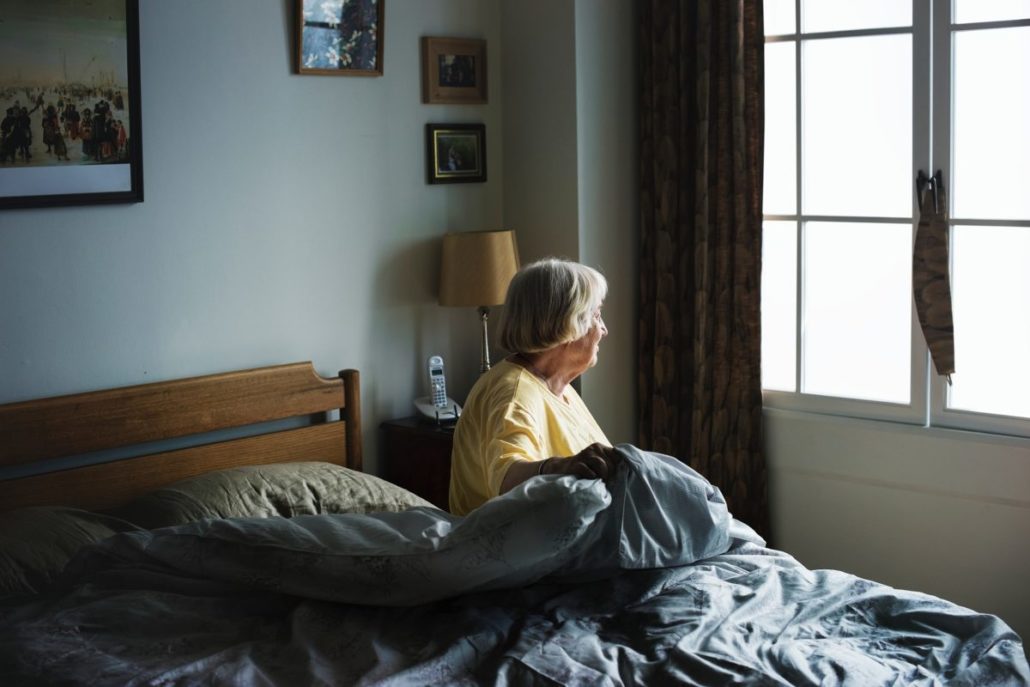Battling Sleep Problems In Seniors
Sleep patterns change as we age, with studies showing that seniors enjoy less quality sleep, feel more tired during the day, take longer to fall asleep, enjoy less REM (dream sleep), and have more sleep disorders than younger people, according to the National Sleep Foundation. One key factor involved in keeping elderly people awake is an alteration in their circadian rhythm: seniors tend to feel tired earlier in the evening, and alert earlier in the morning. Moreover, around 44% of seniors have insomnia, often due to a medical or psychiatric condition. Because insomnia and other problems can hail from a variety of causes, precise treatment varies according to the individual. However, approaches such as cognitive behavioral therapy, bright light therapy and optimal bedroom design that puts comfort at the forefront, are considered effective for mild to moderate cases.
Nerve-Related Causes For Lack Of Sleep In Seniors
In the year 2014, a groundbreaking study by University of Toronto scientists found that as people grow older, a specific group of nerve cells whose loss leads to sleep disruption, is depleted. Lead researcher and Professor of Neurology at Harvard Medical School, Dr J Putnam, noted that “Sleep loss and sleep fragmentation is associated with a number of health issues, including cognitive dysfunction, increased blood pressure and vascular disease, and a tendency to develop type 2 diabetes.” Loss of vital nerve cells, he added, could contribute to the development of these diseases as we age. Studies have also shown that the less seniors sleep, the faster their brain ages, which highlights the importance of enjoying good quality sleep on a regular basis.
Psychological Reasons For Loss Of Sleep
As stated in a study published in Sleep Medicine Clinics, in addition to medical illnesses like arthritis, mental conditions such as depression and anxiety can also keep seniors awake. Often, solitude or living far away from loved ones can exacerbate these problems and their effects on sleep. Common treatments for wakefulness include bright light therapy (exposure to bright light in the evening can help delay seniors’ circadian rhythms) and changes to sleep hygiene (sleep routines). However, psychological problems also need to be addressed. In addition to receiving therapy (cognitive behavioral therapy is considered a gold standard treatment with a high success rate), seniors should also embrace opportunities for assistance and connection. Provided they are eligible for Medicaid, for instance, they may be entitled to assisted living aid, which helps them connect with and find a friendly voice in their carer.
Changes To Sleep Routines
Sometimes, simply establishing a strict sleep routine can bring about big improvements in sleep. Bedrooms should be optimally designed so that they are completely dark and soundproof. The use of blackout curtains and (in the summer) air conditioning can help create a comfortable and cool space that stimulates sleepiness. A flame retardant-free bed with the right firmness for one’s sleeping position will provide an optimal place to rest while protecting respiratory health. Stress relief can also help. Yoga, meditation, and Tai Chi can help seniors battle the stress that can trigger anxiety, as well as depression. Stimulating beverages like coffee should be avoided in the evening. Finally, a warm bath and soothing exercises like progressive muscle relaxation can help reluctant sleepers snooze faster.
There are numerous physiological and mental reasons why seniors may find it harder to sleep. In general, a decline in levels of helpful nerve cells and changes in sleep patterns and circadian rhythms can make it harder to get a good night’s shut-eye. Seniors struggling to rest properly should see a sleep specialist to rule out conditions like sleep apnea, which requires specific treatment. By working alongside a specialist, seniors can formulate a strategy that attacks insomnia and wakefulness form a multi-faceted perspective.






